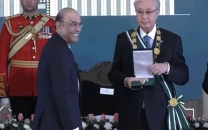PTI challenges 26th Constitutional Amendment in Supreme Court
Party contends that judicial independence cannot be compromised through amendments.

The Pakistan Tehreek-e-Insaf (PTI) has filed a petition in the Supreme Court challenging the 26th Constitutional Amendment, seeking its annulment and a halt to the judicial commission's role in judicial appointments until a final verdict is issued.
PTI's plea argues that the amendment violates the principles of judicial independence and the separation of powers enshrined in the constitution, Express News reported.
The petition contends that parliament cannot alter the fundamental structure of the constitution.
The party also called for all actions taken under the amendment to be declared void, asserting that any change undermining judicial independence is unconstitutional.
PTI maintained that the judiciary's autonomy is a core component of the constitution and cannot be compromised through amendments.
Yesterday, Pakistan Peoples Party (PPP) Chairman Bilawal Bhutto Zardari asserted that only Parliament has the authority to reverse the 26th Constitutional Amendment, stating that no other institution would be recognized if it attempts to undo the amendment.
Bilawal also addressed matters concerning the judiciary, stressing that when a new judge is appointed to the Supreme Court, other judges should ease their transition instead of creating difficulties.
"Whether it’s a bench of the Supreme Court or a constitutional bench, all must respect the Constitution and the law," he added.
Bilawal's remarks come amid growing discussion around the 26th Constitutional Amendment, particularly its rollback.
He made it clear that any rollback of the amendment should only be done by Parliament, warning that neither the PPP nor anyone else would accept any attempt by another institution to undo the changes.
The 26th Amendment has sparked significant debate, with a constitutional bench of the Supreme Court scheduled to hear petitions against it on January 27.
The amendment, passed in October of 2024, introduced key changes to the judicial appointment process, specifically in Article 175-A. These changes were significant, especially as the amendment altered the procedure for selecting the Chief Justice of Pakistan.
On January 16, a bench hearing cases related to the amendment and the powers of the regular bench fractured, highlighting the ongoing tensions surrounding the issue.
The 26th Amendment had previously led to the establishment of a parliamentary committee to select the Chief Justice, a break from Pakistan’s longstanding tradition of selecting the senior-most judge for the role.
Bilawal also reflected on the recent history of judicial appointments, including the controversial selection of Justice Yahya Afridi as the next Chief Justice in October 2024, which led to the modification of judicial procedures through the amendment.



















COMMENTS
Comments are moderated and generally will be posted if they are on-topic and not abusive.
For more information, please see our Comments FAQ